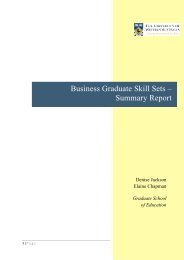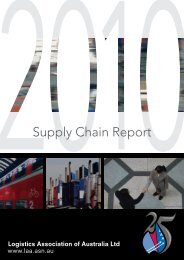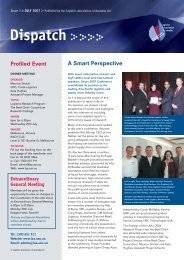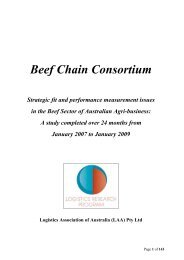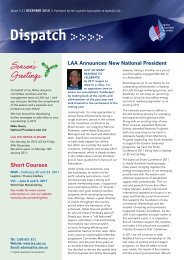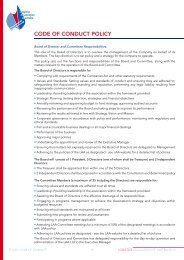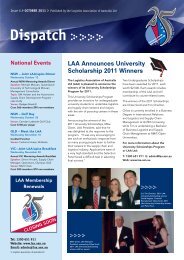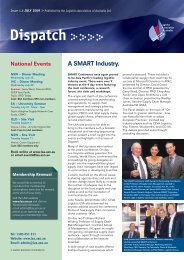Dispatch 2.11 2.indd - Logistics Association of Australia
Dispatch 2.11 2.indd - Logistics Association of Australia
Dispatch 2.11 2.indd - Logistics Association of Australia
Create successful ePaper yourself
Turn your PDF publications into a flip-book with our unique Google optimized e-Paper software.
NSW EVENT REPORT<br />
Road vs Rail<br />
The point was also made that rail is a<br />
more secure distribution method for<br />
hazardous materials or explosives that<br />
could be terrorist targets.<br />
The discussion brought to the fore<br />
some key drivers in the choice <strong>of</strong> road<br />
transport.<br />
Left to right: Zoran Cucukovic, Panel Moderator<br />
with panel members John Crosbie, Consultant; Peter<br />
O'Sullivan, Cement <strong>Australia</strong>; Wayne Klose, OneSteel;<br />
Greg Jones, SCT <strong>Logistics</strong>; Steven Thacker, Ingram<br />
Micro and LAA President, Brad Harrison.<br />
A joint LAA/APICS Dinner Meeting in<br />
Sydney on 21st November attracted<br />
almost 100 members and guests. The<br />
evening departed from the normal<br />
presentation with a panel discussion<br />
on the topical issue <strong>of</strong> Road vs. Rail.<br />
With freight activity in <strong>Australia</strong><br />
projected to double by 2025, rail could<br />
appear to provide the most effective<br />
and economic opportunity to satisfy this<br />
growth. To date, however, government<br />
funding has favoured road over rail.<br />
Zoran Cucukovic, Panel Moderator,<br />
opened up the discussion with the panel<br />
members who all had some interesting<br />
thoughts on the matter. The following<br />
issues were raised during the session<br />
and in the question time that followed.<br />
Although rail is generally seen as the<br />
appropriate transport medium for<br />
industries that handle bulk goods, even<br />
within these types <strong>of</strong> industries, it can<br />
pose limitations. For instance, with grain<br />
volumes affected by climatic extremes<br />
and sites spread right across <strong>Australia</strong>,<br />
the freight task becomes uncertain and<br />
difficult to manage. Added to this are<br />
problems such as whether particular<br />
geographic locations have access to a<br />
rail network, an aging rail infrastructure,<br />
and the perception that as far as<br />
innovation and funding is concerned,<br />
rail is the 'poor cousin'.<br />
On the positive side, there are some<br />
substantial benefits to be gained from<br />
rail freight services. Rail is more energy<br />
efficient than road transport, it produces<br />
less air pollution and fewer greenhouse<br />
gases. It is also safer than road and<br />
helps to reduce traffic congestion.<br />
The size <strong>of</strong> consignments and customer<br />
demand are major factors. For<br />
companies that despatch consignments<br />
or parcels that number in the thousands<br />
every day <strong>of</strong> the week to disparate<br />
destinations, the only viable solution is<br />
road freight.<br />
Global sourcing and manufacturing<br />
<strong>of</strong>f-shore have had a significant impact<br />
on the freight task and, a growing<br />
population and increased consumerism<br />
is causing the freight task to double<br />
every 15 years.<br />
This situation is compounded by JIT and<br />
a 'next day' delivery mentality, or shorttermism,<br />
that currently prevails. Social<br />
and environmental issues are linked.<br />
With rising fuel prices and heightened<br />
awareness <strong>of</strong> climate change, the<br />
thought was posed that maybe 'next<br />
day' will come to be seen as greedy and<br />
delivery in three days will be seen as<br />
responsible. Cost was not considered to<br />
be a significant factor, value was seen as<br />
a more important determinant.<br />
As the focus on reducing carbon<br />
emissions increases, the environmental<br />
impact <strong>of</strong> thousands <strong>of</strong> trucks on<br />
the road day and night will not be<br />
acceptable. Road fleets will be required<br />
to make better use <strong>of</strong> fossil fuels or<br />
adopt alternative technologies.<br />
What emerged clearly during question<br />
time was that, for the supply chain<br />
industry, the question is not whether<br />
to choose one mode <strong>of</strong> transport over<br />
another. Few supply chains can be<br />
exclusive in this. We have to look at our<br />
alternatives as supply chain people. It is<br />
more than likely that the most efficient<br />
and timely supply chain task will<br />
encompass both rail and road transport.<br />
We thank all panel members for<br />
generously contributing their time to<br />
take part in this discussion.



